Easy off-season work will have you prepped and ready when the game gets real

Consistent off-season shooting keeps your skills sharp and builds anticipation for fall. Photo by Bill Konway
When the mercury pushes 100 and kids are still out of school, duck season seems like it’s an eternity away.
But is it? Many early teal seasons start in a month. The first October cold front will blow through in a few weeks. And before you know it, another campaign will be underway. Are you ready? If not, get busy. Here are some easy summer projects that will get you ready for the first flights of fall.
RE-RIG YOUR BLOCKS
Opening day often exposes any lack of preparation, and that’s usually most apparent with decoys. Lines snap. Weights fall off. Perforated plastic fakes take on water. You can avoid those snags and more by simply examining and, if necessary, repairing and re-rigging your blocks weeks before the season.
First, check decoys to make sure they’re still in good operating condition and don’t need to be patched. Examine the lines and knots to ensure that they’re solid. Replace and re-tie those that aren’t. Wash your decoys to eliminate grime and dried muck. If they’re chipped or faded, consider some touch-up paint. It’s that easy.
Don’t Miss: Breeding Duck Numbers Down in North Dakota
PRE-SCOUT YOUR SCOUT
Unless you hunt over water in a Northern production state, it’s pretty tough to anticipate where ducks might show up in November and beyond. However, dry-field hunters can hedge their bets by noting the types of crops planted in fields near traditional waterfowl roosting areas or refuges. Further, online hunting apps can do some of that work for you with colored filters that indicate the crop at a property that season.
After some armchair homework, you can form a good idea of how migrant waterfowl might use ag fields during migration. For example, a large cereal-grain field — oats, wheat, rye, barley and others that are typically harvested relatively early — near a big river or reservoir would be a prime candidate for local Canada geese or early migrating puddle ducks. And any cornfield surrounding a wildlife refuge could be dynamite when the cold hits.
This method isn’t foolproof, but it at least gives you an idea of where to begin looking in fall.
IMPROVE YOUR CALLING
Every duck hunter talks about practicing with their calls during the off-season, but surprisingly few make an effort to do it. Of course, that’s a mistake.
<p class="amp-align-justify">“Just like anything, no one just wakes up one day a great caller,” said Graham Greseth, owner of MaXXed Out Guides. “It takes a lot of practice at home to confidently perform all the different calls and then even more time in the field learning when to use them. There are endless amounts of great instructional videos and tutorials available on YouTube. Find an instructor you like and then get to work.”</p>
<p class="amp-align-justify">After you find a sound you like, put in the reps to perfect your field routines.</p>
<p class="amp-align-justify">“The best advice I can give is to make sure you are doing something in the off-season,” said Cooper Olmstead of Habitat Flats. “Even if it’s just a few minutes a day or a week, something is better than nothing. But if you really want to improve, you need to be consistent and build on your skills. Make sure you are adding more time each week and more difficult sequences.”</p>
Don’t Miss: Is a 3-Pintail Limit Coming in 2025?
GET BETTER AT SHOOTING
As with calling, duck hunters always want to shoot better. And that only comes from shooting a lot during the off-season.
<p class="amp-align-justify">“Like anything, it’s reps and identifying things in your posture and footwork that might be affecting your accuracy,” Greseth said. “More often than not, hunters miss because they rush themselves. Use the off-season to prioritize technique and being intentional on how you apply it. When I coach kids in sports, I tell them that if it’s important to them, they need to practice with correct technique until they can’t do it wrong. My advice for shooters would be the same.”</p>
<p class="amp-align-justify">Olmstead said shooting practice should become part of an enjoyable summer routine.</p>
<p class="amp-align-justify">“This isn’t something that you have to be daily by any means,” he said. “Once a week at a local shooting range or Izaac Walton League would be more than enough. And if you are really looking to improve your skills, I would not only shoot trap, but I would include sporting clays and different types of more realistic duck hunting shots.”</p>
Check out APX, Realtree’s Newest Camo Pattern
<p class="amp-align-justify"> </p>












